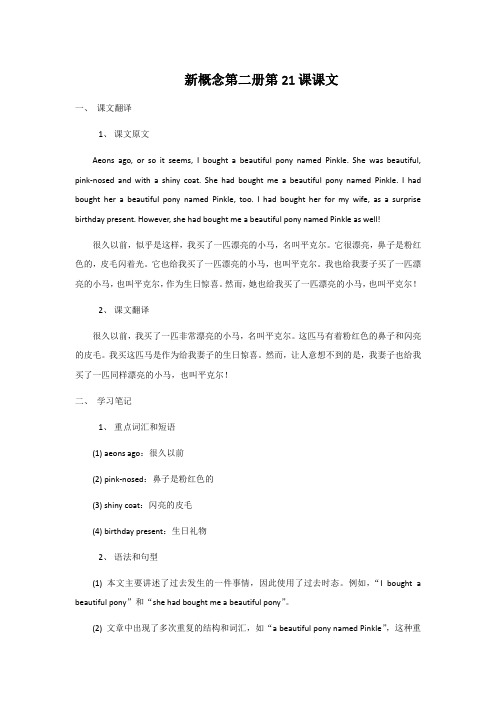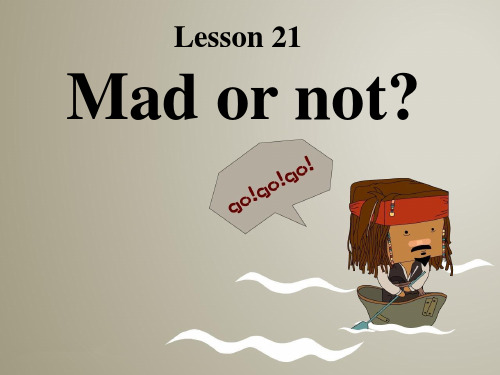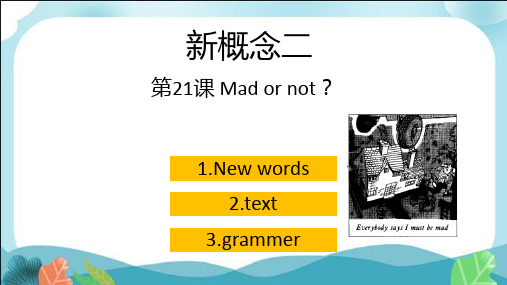新概念二册21课精品哦
新版 新概念英语二册讲义--21

• go mad
发疯
• = go crazy
• =go bananas
• They are going mad/craze/bananas.
reason n. 原因
• For this reason 因此
由于这个原因;为此,
• For this reason, I was late.Βιβλιοθήκη • reason for…
…的原因
• The reason for the flood was that heavy rain.
• 水灾是那场大雨造成的。
• as+句子
由于……
• because+句子 由于……
• because of +名词或代词
• for + 句子
sum
n. 量
• 总额;总和 • a sum of +不可数名词 一笔…,大量… • 一大笔… • a large sum of …… (large 指数量的大) • 一大笔钱
• 某个幸运儿昨天中了彩票。
• 4. Last year, however, it came into use.
• come into use 启用,开始被使用(没有 被动式)
• The road came into use last month. • 这条路上个月开始使用。 • When did the train come into use?
• a great many + 可数名词复数 • a great number of + 可数名词复数 • plenty of… 足够多的…
• We still have plenty of water for the next 20 days.
(完整版)新概念英语第二册学生用书Lesson21.

是不是疯疯了?Lesson 21 Mad or not? 是不是First listen and then answer the question.听录音,然后回答以下问题。
Why do people think the writer is mad?Aeroplanes are slowly driving me mad. I live near an airport and passing planes can be heard night and day. The airport was built years ago, but for some reason it could not be used then. Last year, however, it came into use. Over a hundred people must have been driven away from their homes by the noise. I am one of the few people left. Sometimes I think this house will be knocked down by a passing plane. I have been offered a large sum of money to go away, but I am determined to stay here. Everybody says I must be mad and they are probably right.和短语语New words and expressions 生词和短mad(1. 1/m$d/adj. 发疯sum(1. 7/sm/n. 量reason(1. 3/'ri:z+n/n. 原因determined(1. 8/di't*:mind/adj. 坚定的,下决心的文注释释Notes on the text 课文注1 Aeroplanes are slowly driving me mad.飞机正在逐渐把我逼疯。
新概念英语第二册第21课课文

第21课 A rainy morning课文内容:1. 课文开头描述了一个雨天的早晨,天空乌云密布,雨点纷纷扬扬地落下,树叶湿漉漉的,道路上积水成了一片。
整个城市显得阴沉沉的,空气中弥漫着淅淅沥沥的雨声。
2. 主人公在这样的天气里,不禁感叹大自然的伟大和神奇。
他看到了雨水的许多奇妙之处,例如雨水会从树叶上滑下来,落到地面上形成水坑,孩子们会在水坑里玩耍。
3. 尽管天气阴沉,但主人公的心情却很愉悦。
他欣赏着雨水的魅力,感受着大自然的美好。
他相信,每一种天气都有它独特的魅力,雨天也不例外。
4. 雨水滋润了大地,使植物生机勃勃,给人们的生活带来了清新和舒适。
主人公在雨中漫步,感受着大自然的神奇和美丽,心情愉悦、平静。
5. 主人公希望人们能够像他一样,欣赏雨水的美丽和大自然的魅力,不要让阴沉的天气影响自己的心情,而是要积极乐观地面对生活中的各种天气变化。
文章结构:1. 引言:描述雨天的早晨,介绍主人公的情绪和心情。
2. 雨水的奇妙:讲述雨水的独特之处和对大自然的感悟。
3. 愉悦的心情:主人公的心情和态度转变,对雨天的感受。
4. 大自然的美丽:雨水滋润大地、给人们带来的好处。
5. 结尾:主人公的期望和呼吁,希望人们积极乐观地面对生活。
总结:本课文通过描述雨天的景象和主人公的心情,展示了大自然的魅力和雨水的美丽。
也传达了主人公积极乐观面对生活的态度和希望。
这篇课文深刻地表达了人与大自然的和谐相处,以及向人们提出了积极乐观的生活态度的呼吁。
漫步在雨中的感觉让人心旷神怡,仿佛整个世界都变得宁静而美好。
雨水从天空中落下,落在树叶上,形成了一幅美丽的画面。
树叶在雨水的滋润下,显得格外娇嫩而翠绿。
主人公不禁停下脚步,静静地欣赏着大自然的美丽景色。
在雨中,他看到了孩子们在水坑里玩耍的身影,他们毫不在意自己的衣服被淋湿,只顾着在雨中嬉戏。
这让主人公感叹大自然的魅力,雨水的独特魅力让人心情愉悦。
他认为,雨水不仅滋润了大地,也能给人们带来快乐和清新的心情。
新概念英语第二册课件Lesson21(共37页)

Lesson 21 Mad or not? 是不是疯了?
Aeroplanes are slowly driving me mad. I live near an airport and passing planes can be heard night and day. The airport was built during the war, but for some reason it could not be used then. Last year, however, it came into use. Over a hundred people must have been driven away from their homes by the noise. I am one of the few people left. Sometimes I think this house will be knocked down by a passing plane. I have been offered a large sum of money to go away, but I am determined to stay here. Everybody says I must be mad and they are probably right.
Left
Left 作为定语的时候放在名词的后面 There is only 2 yuan left in my pocket . There is nobody left in the room.
Come in to use
Come into use 投入使用 When did this words come into common use ? The airport come into use last year. go out of use The present phone boxes will go out of use .
青少版新概念2B Unit21精品课件

degrees Celsius [di'ɡri:z 'selsiəs]
n. 摄氏度
Temperature will rise to 12 degrees Celsius in the day.
白天气温将会上升到12摄氏度。
rise fall
v.上升 v.下降
夜间气温将会下降至4摄氏度。
Night temperature will fall to 4 degrees Celsius.
从今天起,风将会从西南部吹过来。
从明天起,风将会从东南部吹过来。
From tomorrow , the wind will blow from the south east.
The wind will bring in warm air from the Atlantic.
风将从大西洋带来暖空气。
我将每天晚上睡在同一张床上。 I'll sleep in the same bed every night. 有一天我会遇到合适的人。 One day,I'll meet the right man.
Have a dictation
New words:
move yet
移动 搬家 尚未
forecast
在接下来的三个月,这个城市将 会有大量阵雨。 This city will have lots of rain showers in the next three months.
thermomete r [θə'mɔmitə
n. 温度计
]
temperatur e ['tempəritʃə]
n. 温度
outlook
n.前景,展望
新概念英语第二册第21课

新概念英语第二册第21课Lesson 21 Getting energy from the sunThe sun is the source of all energy on Earth. Plants use sunlight to make food through a process called photosynthesis. This food is then transferred to animals when they eat plants. In this way, energy from the sun is passed on through the food chain.Solar panels are devices that can directly convert sunlight into electricity. They consist of many small units called photovoltaic cells. When sunlight shines on these cells, they produce an electric current. Solar panels are becoming increasingly popular as a renewable energy source because they do not release any harmful pollutants.Solar power is used in various ways. It can be used to heat water or even to power entire buildings. Some countries are investing heavily in solar power as a way to reduce their dependence on fossil fuels and decrease greenhouse gas emissions.Another way to harness solar energy is through solar thermal systems. These systems use mirrors to reflect sunlight onto a receiver, which then converts the heat into usable energy. Solar thermal systems are used to heat water, generate electricity, and even provide heating for homes.Overall, solar energy is a clean and sustainable source of energy. By harnessing the power of the sun, we can reduce our impact on the environment and create a more sustainable future.。
新概念英语第二册:第21课课文详解及语法解析

新概念英语第二册:第21课课文详解及语法解析-CAL-FENGHAI.-(YICAI)-Company One1新概念英语第二册:第21课课文详解及语法解析课文详注 Further notes on the text1.I live near an airport and passing planes can be heard night and day. 我住在一个机场附近,过往飞机日夜不绝于耳。
(1)passing 是现在分词,作形容词用,表示“经过的”、“过往的”:He stopped a passing car.他挡住了一辆过往汽车。
He forgot the man with passing time.随着时间的消逝,他忘掉了那个人。
(2)night and day是固定短语,意为“日日夜夜”、“夜以继日”:He thought of the matter night and day.他日夜在想这个问题。
He worked night and day.他夜以继日地工作。
2.The airport was built years ago, but for some reason it could not be used then. 机场是很多年前建的,但因为某种原因当时未能启用。
(1)years 前面不加确定的数词时,一般表示“很多年”,weeks等的用法与它相似:He left the city years ago.他多年前就离开了这座城市。
I have not seen him for weeks.我已经有好几个星期没见他了。
(2)some 在这里不表示“一些”,而表示“某个”、“某种”等:I'll tell you someday.有一天我会告诉你的。
We'll talk about it some other time.我们改日再谈这件事。
3.…it came into use. ……机场开始使用了。
新概念英语第二册 Lesson 21课件

翻译短语
1. 把他们逼疯_d_r_iv__e_t_h_e_m___c_r_a_zy 2. 一个正在游泳的女孩a__s_w_i_m__m__in__g_g_i_r_l 3. 一大笔钱_a_l_a_r_g_e__s_u_m__o_f__m__o_n_e_y
1). knock down 拆散,撞倒 2). offer v. 提供(相当于given)
offer sb sth = offer sth to sb 提供给某人某物 give sb. sth.=give sth to sb 给某人某物
offer to do sth 主动提出做某事
8.Everybody says I must be mad and they are probably right.
Gina can be taken good care of by Amy. 情态动词: S+ can/may/must/should + be+过去分词
4.They will finish the work in ten days.
6.I am one of the few people left. 1). one of+名词复数 +谓语动词的单数
+形容词的最高级 +谓语动词单数
2)left表示被留下来的,leave的过去分词, left作 定语后置 left 剩下的……东西
Eg: I have a bag left.
Eg: There is ten cents left in my pocket. (cent [sent] n.(货币单位)分, 分币)
新概念第二册第21课课文

新概念第二册第21课课文一、课文翻译1、课文原文Aeons ago, or so it seems, I bought a beautiful pony named Pinkle. She was beautiful, pink-nosed and with a shiny coat. She had bought me a beautiful pony named Pinkle. I had bought her a beautiful pony named Pinkle, too. I had bought her for my wife, as a surprise birthday present. However, she had bought me a beautiful pony named Pinkle as well!很久以前,似乎是这样,我买了一匹漂亮的小马,名叫平克尔。
它很漂亮,鼻子是粉红色的,皮毛闪着光。
它也给我买了一匹漂亮的小马,也叫平克尔。
我也给我妻子买了一匹漂亮的小马,也叫平克尔,作为生日惊喜。
然而,她也给我买了一匹漂亮的小马,也叫平克尔!2、课文翻译很久以前,我买了一匹非常漂亮的小马,名叫平克尔。
这匹马有着粉红色的鼻子和闪亮的皮毛。
我买这匹马是作为给我妻子的生日惊喜。
然而,让人意想不到的是,我妻子也给我买了一匹同样漂亮的小马,也叫平克尔!二、学习笔记1、重点词汇和短语(1) aeons ago:很久以前(2) pink-nosed:鼻子是粉红色的(3) shiny coat:闪亮的皮毛(4) birthday present:生日礼物2、语法和句型(1) 本文主要讲述了过去发生的一件事情,因此使用了过去时态。
例如,“I bought a beautiful pony”和“she had bought me a beautiful pony”。
(2) 文章中出现了多次重复的结构和词汇,如“a beautiful pony named Pinkle”,这种重复可以增强文章的节奏感和幽默感。
新概念第二册第21课

6.I am one of the few people left. Sometimes I think this house will be knocked down by a passing plane.
1). one of 的用法(3点) +名词复数 +谓语动词的单数+形容词的最高
2)leave---left---left , left,意思是“剩下的,剩余的”. I have a bag left. There is ten cents left in my pocket.
• Many people speak English.(主动语态) • English is spoken by many people.(被动语态)
被动语态构成
• 助动词+及物动词的过去分词
•
( be + P.P.)
以see为例,比较主动语和态被 动语态的结构形式
主动语态改为被动语态的方法
• The desk was made by Master Wang.
• The bag was taken away by his sister.
• 3. 为了更好地安排句子The wellknown person got on the bus and was immediately recognized by people. (一个主语就够了)
新概念2第21课课件

• • • • •
表“许多”的短语: a great many + pl. a great/large number of + pl. an amount of (money) a (large)sum of (money)修饰货币
sum n. 量
n. 大意,要旨 the sum of a speech 演讲大意 sum up (1) 合计 sum up all the expenses 把所有的花费加起来 (2) 总结,概括 eg. To sum up, he agrees with us. 总的来说,他同意我们的观点。 in sum = in a word / in short / in brief 总之,要言之
sleeping •a __________(sleep)boy = a boy who is sleeping
talking •The man_________ (talk)with my father is Mr. Wang.
developing •China is a __________(develop)country.
determined adj 坚定的,下决心的
determine vt. 决定,确定,影响 determine a date for a meeting 确定开会的日期 determine on sth 决定做某事 determine to do sth eg. We determined to study English hard. 我们决定要努 力学习英语。 be determined to do sth.下决心做某事 eg. I am determined to stay here. 我决定留下来。 表示下决心做某事,句型知多少? make up one’s mind to do sth decide to do sth make a decision to do sth
新概念第二册21课(共29张PPT)

Lesson 21
New words
mad /
/ adj. 发疯的
resbabesoimsna/mdaadb.out//
Lily is no.n原/因for
mad. sth./
sb.
狂热地迷恋某人或某物
Give me a satisfied _r_e_as_o_n__. B: We need a large _s_um__ of money.
We have only the last bread.
New words and expressions
mad
adj.
reason
n.
sum
n.
determined
★现在完成时的被动语态: have(has)+ been + v-ed This road has already been repaired. 这条路已经被修理过了。
★含有情态动词的被动语态:
can(could)+ be + v-ed must + be + v-ed must + have + been + v-ed Your watch can be repaired. 你的表能被修好。
homes? 3. Why do people think the writer is mad?
Text
*Aeroplanes are slowly driving me mad. drive sb. mad 逼某人发疯了
*I live near an airport and passing planes can be heard night and day.
新概念二 第21课课件

We'll talk about it some other time.
课文注释
课文注释
3. The airport was built years ago, but for some reason it could not be used then. 机场是许多年前建的,但由于某种原因当时未能启用。 (1)years 前面不加确定的数词时,一般表示“许多年”,weeks等的用法与它相似: He left the city years ago. 他多年前就离开了这座城市。
• 4.determined (1.8)/dr't3:mind/adj.坚定的,下决心的
·★1. mad
1.sb. be mad I must be mad! 我一定是气坏了! 2.be mad at sb生某人的气 You're just mad at me because I don't want to go. 因为我不想去,你就对我火冒三丈。 mad at也可以和get搭配,表示变得对某人生气 You got mad at me then, too. 你那时候也对我不爽了。
新概念二
第21课 Mad or not?
1.New words 2.text
3.grammer
New words and expressions
New words and expressions
• 1.mad (l.1)/mæ d/ adj. 发疯
- 1、下载文档前请自行甄别文档内容的完整性,平台不提供额外的编辑、内容补充、找答案等附加服务。
- 2、"仅部分预览"的文档,不可在线预览部分如存在完整性等问题,可反馈申请退款(可完整预览的文档不适用该条件!)。
- 3、如文档侵犯您的权益,请联系客服反馈,我们会尽快为您处理(人工客服工作时间:9:00-18:30)。
似I have not seen him for
• 2)for some reason
• • •
由于某个理由
some+可数名词单数:某一 some book some+可数名词复数:一些 some books some+不可数名词: 一些 some water
•
• •
I’ll tell you some day.
时态 一般现在时 一般过去时 一般将来时 (过去将来时) 现在进行时 (过去进行时) 现在完成时 (过去完成时) 含情态动词 主动语态 see / sees saw will (shall) +see would(should)+see am(is,are)+seeing was(were)+seeing have(has)+seen had+seen 情态动词+see 被动语态(be+过去分词) am(is,are)+seen was(were)+seen will(shall)+be+seen would(should)+be+seen am(is,are)+being+seen was(were)+being+seen have(has)+been+seen had+been+seen 情态动词+be+seen
6.I am one of the few people left. Sometimes I think this house will be knocked down by a passing plane. 1). one of 的用法(3点) +名词复数 +谓语动词的单数+形容词的 最高 2)left表示被留下来的,leave---left---left , left作定语后置,常放n.后. left 剩下的……东西, I have a bag left. There is ten cents left in my pocket.
• go out of use停止使用 • The phone boxes will go out of next year.
• 5.Over a hundred people must have been driven away from their homes by the noise. • 1)over = more than • 2) away from 离开 • 3)Home ,family与 house • home:家,强调有感情;house仅仅指房 子;family:家人 • home=family+house • must have done 对发生完的事情有把握 的判断 • must have been done (被动形式)
将下列句子改成被动语态。
Homework
• • • • • 1.复述课文+12选择 2 听写21+7单词 3.听力1篇 4.摘要写作+卷子 签字
Have a nice day. 2015.5.22
By Cherry
helicopter直升机
jet喷气式飞机
Lesson21 Mad or not? 是不是疯了?
First listen and then answer the questions.
• • • •
• • • •
Is the writer slowly going mad or not? Where does he live? What can be heard night and day? Have most of his neighbours left their homes or not? Has he been offeret is he determined to do? What does everyone say? Are they probably right or wrong?
key sentences重点句型
• 1.Aeroplanes are slowly driving me mad. • drive sb. mad 使某人发狂,发疯 • The noisy neighbor almost drives me mad.
• 2.I live near an airport and passing planes can be heard night and day. • 句中passing是现在分词,用来修饰名词planes, 起形容词作用。 pass:1.及格 I didn't pass the exam. • 2.传递 Pass me the book,please. • 3.经过,穿过 He passes my house on the way to school.
• The desk was made by Master Wang. • The bag was taken away by his
主动语态改为被动语态的方法
• 将主动语态的宾语改为被动语态的主 语。 • 将主动语态的谓语动词改为“be+过去 分词”结构。 • 将主动语态的主语改为介词 by之后的 宾语,放在谓语动词之后(有时可省 略)。
• 1.We use English as a foreign language. →
• English is used as a foreign language( by us) • 2. People write business letters in English → • Business letters are written( by people) in English. • 3.They make telephone calls in English. → • Telephone calls are made( by them) in English. • 4.Travelers and business people use English. → • English is used by travelers and business. • 5.Farmers grow rice in Zhejiang. → • Rice is grown by farmers in Zhejiang
sum n.量 a large sum of:大量的,常跟钱连用 a large sum of money 一大笔钱
decide和determine
• 相同点:两者都有“决定”的意思 • 不同点:decide:指经过询问、研讨后在几种 可能的选择中做出决定。即不再迟疑不决。 • He decided to leave here on Sunday instead of Monday.他决定周日而不是周一离开 • determine to do 下定决心做某事(不动摇) • I determined to stay here.(本文)
be determined to do sth 下定决心要做 8.Everybody says I must be mad and they are probably right.
1)Everybody不定代词作主语谓语动词用单数 2)must be 表对现在事实的肯定推测
• 动词语态
• 英语动词有两种语态
肯定句,否定句及疑问句如下。
Cars are made in Changchun. Cars are not made in Changchun. ---Are cars made in Changchun? (---Yes, they are./No,they aren’t.) Where are cars made?
7.I have been offered a large sum of money to go away,but I am determined to stay here. offer sb sth offer sth to sb give sb. sth. give sth. to sb.
offer sb. a large sum of money • =offer a large sum of money to sb. • give sb. a large sum of money • =give a large sum of money to sb.
New words and expressions
• • • • • mad adj.发疯 He is quite mad.他完全疯了 a mad plan 冒险的计划 mad adj.生气的,愤怒的 She was mad with me for my losing her keys. • mad adj.狂热的,着迷的 • She is mad about going to dance.
3)sometimes 有时候 sometime (过去或将来)某时候 some time 一段时间 some times 几次,几倍 (注:这是中国 人的用法,地道的说法是:several times) 4)knock down 拆散,撞倒 knock at 敲 knock out 打昏 knock off 下班;从…碰下去;优惠, 折扣 knock over 撞翻,打翻,撞倒
We’ll talk about it some other time. 我们改日再谈这件事。
• st year,however,it came into use. • come into use=put into use投入使用 • When did this word come into common use?
aeroplane airplane plane helicopter jet
aeroplane=airplane专指普通飞机, 区别:aeroplane是英语,airplane 是美语
